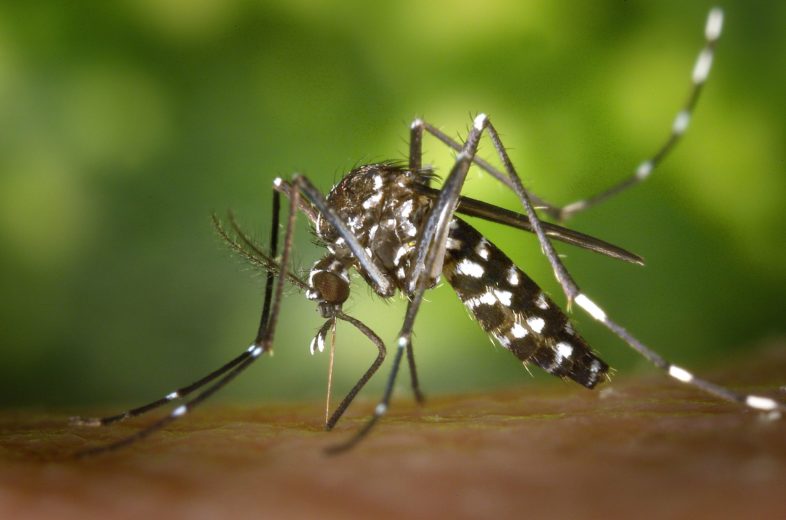Asian Tiger Mosquito Found in Vermont

Asian tiger mosquito, Aedes albopictus, beginning its blood-meal. Image James Gathany, Centers for Disease Control and Prevention’s Public Health Image Library (PHIL), with identification number #2165.
BURLINGTON, Vt – State Agriculture and Health officials announced that the Asian Tiger mosquito (Aedes albopictus) has been identified for the first time in Vermont. This normally tropical/subtropical species is a known disease vector for Zika, chikungunya and dengue viruses, infecting humans in countries where these diseases are present. The mosquitoes found in Vermont do not currently carry these viruses.
Natalie Kwit, public health veterinarian with the Vermont Department of Health, said that while the discovery of Aedes albopictus in the state is notable, Vermont’s climate is currently inhospitable for the mosquito species for most of the year, making it unlikely they will be spreading new diseases here any time soon. “The diseases they can carry are not endemic to our area, and in fact are rarely found anywhere in the United States,” said Kwit.
Environmental Surveillance Program Director Patti Casey of the Vermont Agency of Agriculture, Food and Markets said the mosquitoes, which were hatched from eggs collected in Windham County as part of the state’s vector surveillance program, were laboratory-identified on September 24, 2019.
Casey said, however, that it is too soon to know whether the mosquito’s presence is an anomaly or if the species will be an ongoing part of the state’s ecosystem. “The Asian Tiger mosquito population may not be able to survive a Vermont winter,” said Casey. “It’s possible that this is a transient population — perhaps brought to Vermont by car or truck. Continued surveillance is needed to establish whether this mosquito population will be able to overwinter as eggs or otherwise return to Vermont.”
According to the Centers for Disease Control and Prevention there is currently no local transmission of Zika in the continental United States, but Zika continues to be found in Puerto Rico. Dengue fever outbreaks in the U.S. are extremely rare – only Hawaii, Florida and Texas have had confirmed cases from local transmission. There have been no locally-acquired cases of the chikungunya virus in the United States since 2015.
Like the mosquitoes we already have here in Vermont, the Asian Tiger mosquito has also been found to carry West Nile virus (WNV) and Eastern Equine Encephalitis (EEE) but is not considered a primary vector for these diseases.
Kwit said that the finding of Aedes mosquito eggs is an important reminder of the public health challenges posed by climate change. “Warming temperatures and changing precipitation patterns are affecting the suitability of Vermont’s habitat, which can introduce insects, animals, and diseases that previously weren’t found in our area.”
Vermont’s mosquito surveillance program typically concludes in mid-October, when the risk for mosquito-borne diseases declines. For more information about the program, visit agriculture.vermont.gov/public-health-agricultural-resource-management-division/plant-health-and-pest-management-1
Learn more about mosquito-borne diseases and how to prevent mosquito bites: healthvermont.gov/mosquito.






